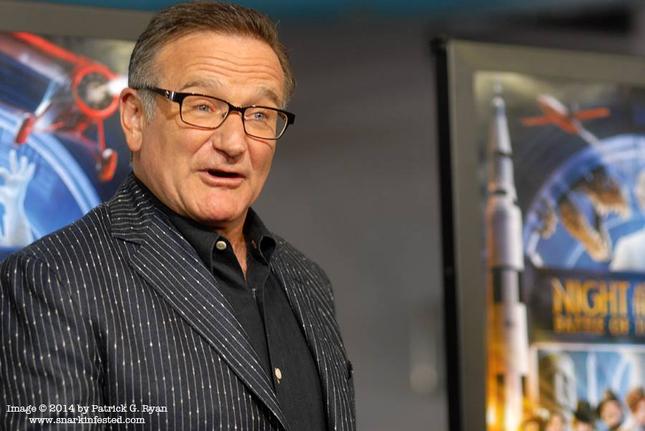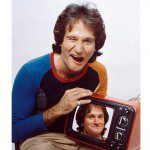Robin Williams: He Left Us Laughing for a Lifetime
By • August 18, 2014 0 1223

They stuffed the news in right at the end of a local news broadcast, leading into a national one, yesterday: “We’ve just learned that it appears that Robin Williams has died” or words to that effect.
It was an eye-blink moment, as if you’ve just heard something that wasn’t quite right, couldn’t be true. No details, just a Joe Friday just-the-facts.
Until the news was confirmed by online news sites and midway through the nightly news, I didn’t quite believe it. Williams was such a motor mouth, such a force of nature. How do you put the shut-up quiet on that?
Death has its ways, as it turns out. Williams had already been gone for a number of hours at that point, found dead in his home in Tiburon, in Marin County outside San Francisco, Calif., apparently a suicide by asphyxiation at the age of 63. Williams was known to suffer from depression — as sometimes the people who make you laugh the hardest do — and to have gone back into rehab. He openly battled alcohol and drug addictions throughout his life, a process which sometimes found its way into his standup comedy routines. (“Cocaine,” he quipped, “is God’s way of telling you you’re making too much money.”)
Mostly, Williams was a wizard, one of those non-stop brilliant imagineers, blessed and cursed with great talent, an ability, for instance—to play with literally an army of toy soldiers and individualize and talk with each and every one of them as a child—to create worlds that spilled out of his mouth, his mind, heart and soul with alarming rapidity, full-blown, uncensored, profanely funny. He became others fluently, with both facility and intensity, almost at will.
When Robin Williams got on a stage and grabbed a mike, he was a one-man parade. He was the trombone, the drummer, the cheerleader, the politician waving to the crowd, the clown in full, sloppy makeup, the baton twirler, the confetti and the Shriners doing wheelies — and, boy, did we love his parade.
He really was a gift and gifted. It’s easy to think of him in any number of ways, in so many parts. He was a comic, to be sure, a clown, for sure, but he was always a hard-working, convincing actor who explored as many arenas of human experience as he could, on stage, but on the screen as well. He was a bona fide movie star, and on the small screen, where he first and forcefully invaded our consciousness as the Mork of “Mork and Mindy,” a goofy alien send to study earthlings, he nano-nanoed his way into our living rooms along with the bewildered, sweet Pam Dawber.
His inspiration was Jonathan Winters, the man of many parts, who slid easily and with remarkable aplomb in and out of characters who sprang fully blown, with beady eyes, onto a stage or in front of a camera. He was Winters on steroids, in a way, but mostly he was Williams, hairy, curly haired, sometimes bug eyed, profane as all get out, pacing like someone who’s just escaped a straight jacket.
President Obama, in a White House statement, captured him movingly, referencing his movie roles: “Robin Williams was an airman, a doctor, a genie, nanny, a president, a professor, a bangarang Peter Pan, and everything in between. He was one of a kind. He arrived in our lives as an alien, but he ended up touching every element of the human spirit. He made us laugh. He made us cry.”
Williams first arrived on the movie screen as “Popeye,” a big-screen version of the sailor-man hero of the daily comics, directed by none other than Robert Altman. I will admit to liking it and him a lot—although I was in a critical and popular minority on that one. It was a comic truly envisioned as otherworldly and totally believable, bulging muscles, tattoo and love for Olive Oyl (aggressively played by Shelley Duvall), it was all colors and magic.
But he found his stride as both a comic actor (the memorable, manic “Good Morning Viet Nam” and “Moscow on the Hudson” and the dazzling “Mrs. Doubtfire”) as an actor-actor (“Good Will Hunting,” for which he won an Oscar, the understated (yes, a quiet Robin) and inspiring teacher in “Dead Poet’s Society” and a turn in “The Fisher King.”
Critics preferred Williams’s darker roles as opposed to “Dead Poets,” which they saw as sentimental, a quality they react to in much the same way as the Wicked Witch of the West reacts to Toto. He was praised for creepy and even bad guy roles in “One Hour Photo,” which hardly anyone saw, and “Insomnia,” in which he was paired with Al Pacino and Hilary Swank in a brisk but atmospheric cop and killer noir thriller set in Alaska.
Williams and Steve Miller, comedians both, found the humor under the direction of Mike Nichols in a brief-run Broadway production of Samuel Beckett’s “Waiting for Godot,” in which Vladimir and Estragon at one point yelled at each other, taking turns abusing each other verbally: “Critic,” Williams hurled at Martin, a game-ender, that one.
His imagination, even in not-so-hot-movies, and the recent attempt at a television return, called resonantly “The Crazy Ones” (cancelled), was always running wild.
I had seen him in person once, when he was one of the saluters and razzers for the Kennedy Center’s first Mark Twain Prize for American Humor which honored Richard Pryor. Williams—and a host of his peers—four-lettered in characteristic fashion, giving an impression of how a possibly Irish, shocked Kennedy Center usher might have reacted. “Oh my god, they used that word again, and the other ones, too.” It remains a mystery how Williams managed to avoid receiving the Twain award over the years. George Carlin, one of his idols, won it posthumously.
Still, that news flash about Williams’s death was hard to take, hard to shake, and the days news only made things more final. How do you slow down that dust devil of a performing energy? Truth: You don’t.
I sat in front of my computer and watched his ironically and sadly entitled “Weapons of Self Destruction” standup show. As he downed about 40 plastic bottles of water and paced across the stage like a mountain climber, I watched him go from forest fires to coyotes, to Osama Bin Laden, to Obama, to Schwarzenegger, sprinkling profanity like four-letter, scented and exploding prunes throughout.
I watched, and I listened and I laughed until it made my sides ache. In tribute, I would say this, because it was his gift: I laughed my ass off.
Nothing today is totally final. Something is always left behind, like his trail of funny stuff, a funny man past pacing himself. Wherever he goes, he will land on his feet, motoring.
- Comedian and actor Robin Williams at the May 15, 2009, premiere of “Night At The Museum 2” at the Smithsonian National Air and Space Museum. | Paul G. Ryan/Snarkinfested.com
- Lateef Mangum-D.C. Government



